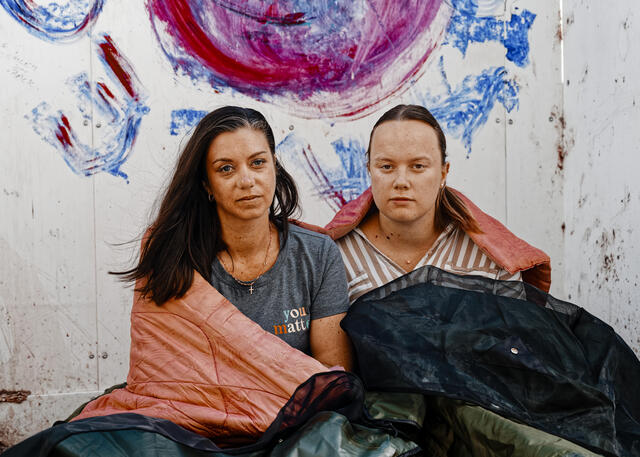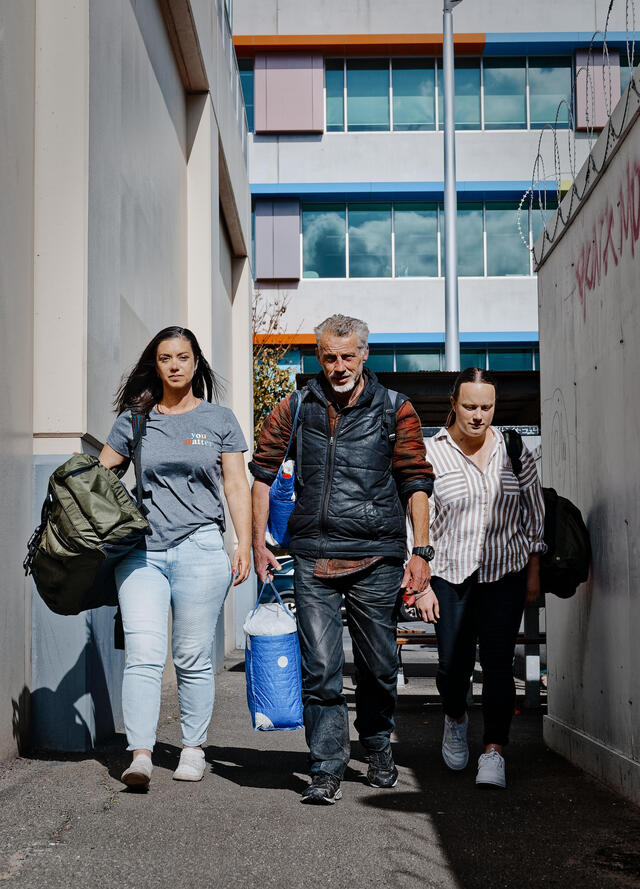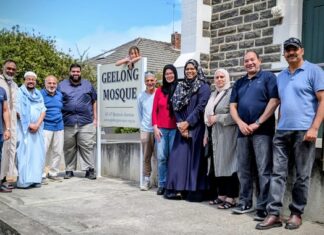Two members of The Outpost have lived on the streets to raise awareness for homelessness in Geelong. Chair Amy Flint and board member Maggie O’Neill left their homes on November 3 for a week as part of the homelessness service’s ‘Week on the Streets’ initiative. Jena Carr speaks with them about the experience.
Amy Flint and Maggie O’Neill have walked in the footsteps of Geelong’s homeless community and spent a week living on the streets.
The women left the safety and comfort of their homes with only the clothes on their backs at noon on November 3 to experience what it would be like to live on the streets.
Maggie said they started the week by walking into the Geelong CBD while looking for places to sleep and eat.
“We were thinking about who we could ask so that we could get blankets or something to keep us warm at night because we had nothing with us,” she said.
“We were also looking for somewhere to eat because we were quite hungry by the end of the day. It was quite uncomfortable going up to complete strangers and asking for help.
“It was challenging in that we had to spark up conversations with people from the public, and we had to ask them where we could find dinner, what we could do, where we could go.
“It was quite challenging to find somewhere to sleep on that first night that was safe, sheltered and accessible. We were lucky enough to sleep out in front of Kardinia Park in one of the shelters.
“That was a really good spot as it had security cameras around it, we were sheltered from the weather, and we had access to bathrooms that were open 24 hours.
“Finding somewhere to sleep at night, you just never know what’s going to happen, so that was quite daunting, but we were really lucky in the spot that we found and the people we came across.”
Accessing basic necessities such as a toilet or shower was one of the biggest challenges with Amy surprised at the lack of available services.
“We had assumed that we could shower and use a toilet, which was an incorrect assumption. So even when looking for places to sleep, the city closes the toilets at 9.30pm,” she said.
“So, when people complain about our alleys, that smell of urine, there’s a reason for that, and that’s because there are no toilets that are publicly available.
“We tracked from Kardinia Park down to Eastern Beach with a 20-kilo pack for most days, and that hot water gets shut off at 10am.
“Although we were up bright and early anyways, it didn’t quite make sense to us why there wouldn’t be hot water available, even to families who were bathing with their children.
“There were also water taps that seemed to have been dismantled that weren’t operational. We didn’t realise that access to drinking water would be hard to find.
“With the physical toll that sleeping rough has on the body, I had bruising on my outer thighs. I hadn’t really understood why I had that kind of bruising, but it was from sleeping on the concrete.”
‘Week on the Streets’ was an initiative of Geelong homelessness support service The Outpost to raise awareness of the challenges faced by those without stable housing.
Amy, chair of The Outpost, said it was “challenging to get the real depths of homelessness” in a week, but they got a clear glimpse into other people’s lives.
“We wanted to ensure that we mitigated risk as much as possible whilst being incredibly genuine and true to the experience,” she said.
“The experience was much more than we had anticipated. We didn’t know what we would uncover when walking out of our homes on Sunday, but it went better than we expected.
“We learnt a lot about the people sleeping rough by spending valuable time without limits or barriers. So, we got to integrate ourselves into the world of rough sleepers.
“The first couple of nights, it was a real challenge to feel safe, and then we did acclimatise quite quickly…but nowhere across the experience did we encounter any people that made us feel unsafe.
“After they saw that we’ve done a couple of days and that our mission was to advocate and raise awareness for homelessness, they really took us into their community.”
Maggie, a board member of The Outpost, said the women couldn’t use any prior knowledge they had about the services around Geelong as part of the initiative.
“We were lucky enough to be told about The Outpost on our first night, so we were able to have a meal, and we got to know a lot of the guys that access it,” she said.
“We wanted to highlight the service providers around Geelong and see what the gaps were, what we were missing, what we could do better, and how we could support the community better.”
Maggie said they also spent an afternoon begging on the street to get a feel for what that would be like for the homeless community as part of the initiative.
“I found it really hard dealing with the judgement from the public and the looks and comments we would get. I found that quite challenging because I’d never been in a situation like that,” she said.
“We had a lot of dirty looks, and a few young people came past and made comments like, ‘I smell poor’, or people telling me that my family didn’t love me, and just all sorts of terrible comments.
“They didn’t read the little sign we had that said, ‘Homeless, can you help? Sleeping rough for a week to raise awareness. All donations go to The Outpost’, but many people didn’t read that.
“If you were actually homeless and had mental health issues or were struggling with substance abuse, those comments could affect you, and you could spiral. So, it was quite tough.
“People on the streets are very strong and resilient. They have trauma and so many challenges, but they get up every day and keep on going, which is amazing to me.
“We just need to say hello and smile at them, so they don’t feel invisible… The most important thing is to acknowledge that they’re a human being going through a tough time.
“We also have to realise that the majority of us are all one pay check away from being in this situation, so don’t be so quick to judge.”
Amy and Maggie returned home on Sunday, November 10, and both said they better understood the community they look after and the services on offer.










